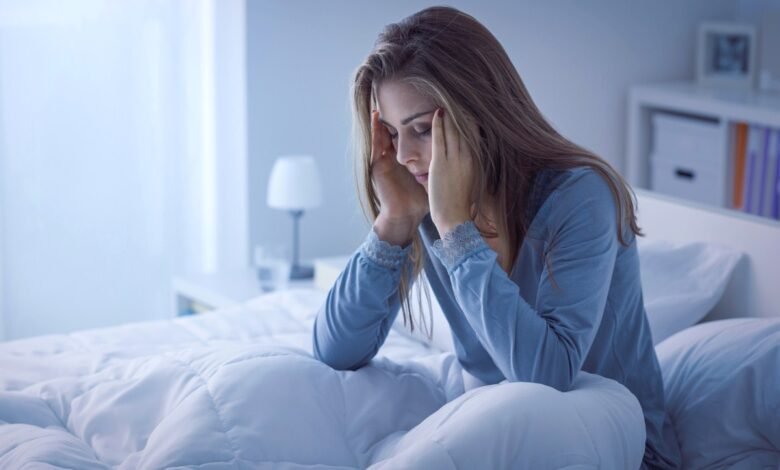Common Causes & Symptoms Of Sleep Apnea

Sleep apnea is a common sleep disorder that affects millions of people worldwide. It is characterized by pauses in breathing or shallow breaths during sleep, leading to disrupted sleep patterns and various health complications. In this article, we will explore the common causes and symptoms of sleep apnea, shedding light on this overall condition that often goes undiagnosed.
Sleep apnea is a sleep disorder that affects the quality of sleep and overall health. It can lead to various complications if left untreated. Understanding the causes and symptoms of sleep apnea is crucial for early detection and effective management of the condition.
Read More: 7 Essential Oils for Better Sleep in 2023
What is Sleep Apnea?
Sleep apnea is a condition where breathing repeatedly stops and starts during sleep. These pauses in breathing can last for a few seconds to minutes and may occur multiple times throughout the night. Sleep apnea is often accompanied by loud snoring and a feeling of being tired even after a full night’s sleep.
Types of Sleep Apnea

There are three main types of sleep apnea:
- Obstructive Sleep Apnea (OSA): This is the most common form of sleep apnea. It occurs when the muscles at the back of the throat relax, causing a blockage of the airway.
- Central Sleep Apnea (CSA): This type of sleep apnea is less common and happens when the brain fails to send proper signals to the muscles that control breathing.
- Complex Sleep Apnea Syndrome (CSAS): Also known as treatment-emergent central sleep apnea, this type of sleep apnea is a combination of obstructive and central sleep apnea.
Causes of Sleep Apnea
Several factors contribute to the development of sleep apnea. These include:
- Obesity: Excess weight can increase the risk of developing sleep apnea due to the accumulation of fat around the airway.
- Narrowed Airway: Some individuals naturally have a narrower airway, which makes them more prone to sleep apnea.
- Age: Sleep apnea can affect individuals of all ages, but it is more common in middle-aged and older adults.
- Family History: Having a family history of sleep apnea increases the likelihood of developing the condition.
- Smoking and Alcohol Consumption: Smoking and excessive alcohol consumption can relax the muscles in the throat, leading to airway blockage.
Obstructive Sleep Apnea

Obstructive sleep apnea is the most prevalent form of sleep apnea. It occurs when the muscles in the back of the throat fail to keep the airway open, despite efforts to breathe. The repeated obstruction of the airway results in brief pauses in breathing, often followed by a gasping or choking sensation as breathing resumes.
Central Sleep Apnea
Central sleep apnea is caused by the brain’s failure to transmit proper signals to the muscles responsible for controlling breathing. Unlike obstructive sleep apnea, there is no physical obstruction in the airway. Instead, the brain fails to initiate the breathing process, leading to pauses in breathing during sleep.
Complex Sleep Apnea Syndrome
Complex sleep apnea syndrome is a combination of obstructive and central sleep apnea. It occurs when an individual with pre-existing obstructive sleep apnea develops central sleep apnea after using continuous positive airway pressure (CPAP) treatment.
Risk Factors
Several risk factors increase the likelihood of developing sleep apnea. These include:
- Gender: Sleep apnea is more common in men than in women.
- Excess Weight: Obesity significantly increases the risk of sleep apnea.
- Age: Sleep apnea is more prevalent in individuals over the age of 40.
- Neck Circumference: Having a thick neck circumference may contribute to airway narrowing.
- Family History: Having family members with sleep apnea increases the risk.
- Smoking and Alcohol Use: Both smoking and excessive alcohol consumption can contribute to the development of sleep apnea.
Common Symptoms of Sleep Apnea
Sleep apnea is often characterized by the following symptoms:
Daytime Fatigue and Sleepiness
One of the most prevalent symptoms of sleep apnea is excessive daytime fatigue and sleepiness. Despite getting what seems like a full night’s sleep, individuals with sleep apnea often feel tired and struggle to stay awake during the day.
Loud Snoring
Loud and persistent snoring is a common symptom of sleep apnea. The snoring is often interrupted by pauses in breathing and followed by choking or gasping sounds as breathing resumes.
Pauses in Breathing
Pauses in breathing during sleep, known as apneas, are a key indicator of sleep apnea. These pauses can last for a few seconds to minutes and may be accompanied by a choking or gasping sensation upon resuming breathing.
Morning Headaches
Individuals with sleep apnea often wake up with morning headaches. These headaches can be attributed to disrupted sleep patterns and insufficient oxygen supply during sleep.
Insomnia and Restless Sleep
Sleep apnea can cause insomnia and restless sleep due to constant interruptions in breathing. Individuals may find it challenging to fall asleep or experience frequent awakenings throughout the night.
Mood Changes and Irritability
Sleep deprivation caused by sleep apnea can lead to mood changes and irritability. Individuals may feel moody, irritable, or have difficulty concentrating during the day.
High Blood Pressure
Sleep apnea has been linked to hypertension (high blood pressure). The repeated disruptions in breathing during sleep can strain the cardiovascular system, leading to elevated blood pressure levels.
Read More: How Time Change Affects Your Sleep
Conclusion
Sleep apnea is a prevalent sleep disorder that can have serious consequences if left untreated. Understanding the common causes and symptoms of sleep apnea is essential for early detection and intervention. If you or someone you know experiences any of the symptoms mentioned in this article, it is important to consult a healthcare professional for proper diagnosis and treatment.
FAQs
Can sleep apnea be cured?
While sleep apnea cannot be completely cured, it can be effectively managed through various treatment options, such as continuous positive airway pressure (CPAP) therapy, lifestyle changes, and in some cases, surgery.
Is sleep apnea only a problem for older individuals?
No, sleep apnea can affect individuals of all ages, although it is more commonly seen in middle-aged and older adults.
Are there any natural remedies for sleep apnea?
While lifestyle changes, such as maintaining a healthy weight, avoiding alcohol and smoking, and sleeping on your side, may help alleviate symptoms, it is important to consult with a healthcare professional for proper diagnosis and treatment.
Can children have sleep apnea?
Yes, children can also suffer from sleep apnea. Common signs in children include restless sleep, snoring, bedwetting, and difficulty concentrating.
Is sleep apnea a serious condition?
Yes, sleep apnea is a serious condition that can have significant impacts on an individual’s overall health. It has been associated with an increased risk of cardiovascular diseases, stroke, diabetes, and other health problems.







